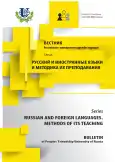№ 4 (2009)
- Год: 2009
- Статей: 20
- URL: https://journal-vniispk.ru/2618-8163/issue/view/23451
Статьи
Слово о юбиляре и его новой книге (к 80-летию со дня рождения В.Г. Костомарова и о его книге «Рассуждение о формах текста в общении»)
Русистика. 2009;(4):5-10
 5-10
5-10


Лингводидактический аспект методики преподавания русского языка как иностранного и пути его изучения
Аннотация
В статье рассматривается одно из важнейших направлений изучения лингводидактики, составляющее научную основу методики обучения русского языка как иностранного. Предлагается дифференцированный подход к традиционным понятиям: учет родного языка, использование сопоставительного метода, типы интерференции.
Русистика. 2009;(4):11-16
 11-16
11-16


Грамматические связи в текстах публичных выступлений на русском языке должностных лиц Таджикистана
Аннотация
В статье показывается, что существуют многочисленные средства смыслового и формального соединения высказываний в текстах публичных выступлений. Наиболее изучены средства связи предложений в письменных текстах, в частности, в текстах деловой коммуникации.
Русистика. 2009;(4):17-23
 17-23
17-23


 24-32
24-32


 33-38
33-38


Риторический вопрос в группе косвенных речевых актов
Аннотация
В статье предпринимается попытка выделить структурно-семантические и функциональные особенности риторического вопроса, отличающие его от других косвенных речевых актов с иллокутивной функцией сообщения. Исследование проводится на материале Национального корпуса русского языка.
Русистика. 2009;(4):39-45
 39-45
39-45


 46-51
46-51


Таутоним как способ демонстрации амбивалентности натуры героя произведения
Аннотация
Статья посвящена анализу дублированного имени Гумберт в романе В. Набокова «Лолита». Актуальность статьи вызвана поиском новых подходов к изучению идиостиля писателя - применением общей теории номинации, теории нарратологии для анализа функциональной и эстетической значимости номинаций в тексте романа В. Набокова «Лолита».
Русистика. 2009;(4):52-56
 52-56
52-56


 57-63
57-63


Формирование межкультурной коммуникативной компетенции через обучение национальному стилю коммуникации
Аннотация
В статье рассматривается проблема коммуникативной лингвокультурной интерфереции, которая существенным образом осложняет процесс межкультурного общения. С целью ее предупреждения в ходе преподавания иностранных языков предлагается уделять особое внимание обучению национальному стилю коммуникации и факторам, формирующих его, - различиям в типах культур, культурных ценностях, в стратегиях вежливости. Данный подход способствует улучшению понимания, преодолению этноцентризма, адаптации к инокультурному контексту и в целом к формированию межкультурной коммуникативной компетенции.
Русистика. 2009;(4):64-73
 64-73
64-73


 74-79
74-79


 80-85
80-85


Опыт применения компьютерных технологий в практике обучения студентов-иностранцев русской звучащей речи
Аннотация
Статья посвящена использованию компьютерной обучающей программы «Русский без акцента» при обучении студентов-иностранцев русской звучащей речи. Обсуждаются результаты применения этой программы и принципы создания нового компьютерного обучающего курса.
Русистика. 2009;(4):86-92
 86-92
86-92


 93-99
93-99


Отзыв о серии интерактивных видео DVD дисков «Чудо-малыш: уроки чтения» и «Чудо-малыш: учитесь как в сказке»
Русистика. 2009;(4):100-101
 100-101
100-101


«За шеломянем еси...»
Русистика. 2009;(4):102-104
 102-104
102-104


Рецензия: Стернин И.А. Избранные работы. Теоретические и прикладные проблемы языкознания
Русистика. 2009;(4):105-106
 105-106
105-106


Рецензия: Дубровина К.Н. «Энциклопедический словарь библейских фразеологизмов»
Русистика. 2009;(4):107-109
 107-109
107-109


Аннотация: Ларина Т.В. Категория вежливости и стиль коммуникации: сопоставление английских и русских лингвокультурных традиций
Русистика. 2009;(4):110-112
 110-112
110-112


Наши авторы
Русистика. 2009;(4):113-114
 113-114
113-114











